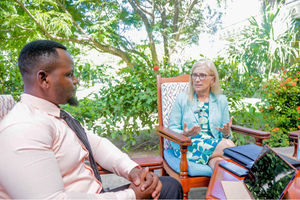THINKING CRITICALLY: Revolution Day, Maulid and constitution
What you need to know:
The author of this think piece was privileged to have been invited, on Saturday, January 11, 2014, the day before Zanzibar Revolution Day, to address a symposium organised by the leadership of students of the Bukoba campus of the St Augustine University of Tanzania, whose theme was National Ethics for the Youth and the Role of the Educated in Addressing Tanzania’s Development Challenges.
Monday, January 13, 2014 was not supposed to be a public holiday, but Tanzanian wage earners were given a pleasant surprise when it was declared, a day before, an extra Revolution Day public holiday by the imperial Union Presidency, which can decide on these costly matters without bothering to consult Parliament.
The majority of Tanzanians, who are mostly rural poor peasants and urban poverty-stricken itinerant informal sector traders, hardly earned themselves an extra pay without work on the extra Revolution Day.
On January 12, 1964, 50 years ago, a group of angry Zanzibaris, the majority with minimum Western schooling, said enough was enough to a system of multiparty political electioneering that always resulted in a minority of privileged Zanzibaris gaining a majority of the seats in the then Zanzibar parliament.
This was a legislative branch of a government of the so-called “independent” Zanzibar that was actually a settler neo-colonialist constitutional monarchy of Arab ancestry to which the departing British colonialists had bequeathed state power, a month earlier in December 1963.
This was power that ought to have been handed over to the organised representative of the majority of Zanzibari peoples, the African and Shiraz peoples of Unguja and Pemba, affiliated to the Afro-Shiraz Party and its left-wing political allies, the Umma Party.
The Zanzibar Revolution was not a tea party and a lot of innocent lives were lost. But, overall, it resulted in the formation of a people’s republic of Zanzibar, whose key leader, Sheikh Abeid Amani Karume, a devout believer in Pan African nationalism, quickly joined Tanganyika’s Mwalimu Julius Kambarage Nyerere in uniting Tanganyika and Zanzibar to form, on April 26, 1964, modern Tanzania.
Yesterday was Maulid Day, a proper public holiday on which Muslims mark the birth of Prophet Muhammad. This is the day immediately after the evening when Muslims take part in prayers in observance of the Prophet’s birth.
For Muslims, this week gave them an opportunity to reflect on the state of art of the world’s ethical infrastructure that has been put in place over the last 1,400 years since the Prophet to help humans to walk through the jungle that is the current global capitalist world without falling prey to various morally corrupting bourgeoisie influences such as greed and an insatiable penchant for personal accumulation at the expense of the pauperization of fellow human beings.
The author of this think piece was privileged to have been invited, on Saturday, January 11, 2014, the day before Zanzibar Revolution Day, to address a symposium organised by the leadership of students of the Bukoba campus of the St Augustine University of Tanzania, whose theme was National Ethics for the Youth and the Role of the Educated in Addressing Tanzania’s Development Challenges.
The Kagera Regional Commissioner, Colonel (rtd) Fabian Massawe, used the symposium opening address to remind the people of the Kagera Region to maintain unity across ethnic, religious and political affiliations so that such unity may help the region to accelerate its socio-economic development. He urged all his listeners, not only students and staff from the Bukoba Campus of St Augustine University of Tanzania, the hosts, but also those from Josiah Kibira University of Tumaini Makuria inaugurated in Bukoba in 2012, the Bukoba campus of the Open university of Tanzania, the legendary Katoke Teachers College, and the recently launched Josiah Kibira Girls High School, to cherish the Kagera regional anthem that appeals to all the people of Kagera to promote peace and development through love, tolerance, solidarity and hard skilled work.
It was a memorable day to see students discussing how the educated youth may prepare themselves to promote ethical values such as honesty, equality and empathy for the socially excluded and downtrodden.
In the words of John Niven, author of The Second Coming, students were adopting the wisdom of saying ‘if you could not reach the world to change it then you tried to change the world within your reach!’ This is a stance at the core of the actions of those who participated in the Zanzibar Revolution to risk their lives in the promotion of Pan African nationalist unity and the establishment of modern Tanzania.
Members of Tanzania’s forthcoming Constituent Assembly must subordinate the narrow partisan interests derived from party political affiliations to the broad Pan African nationalist interests of preserving the Union between Tanganyika and Zanzibar.




